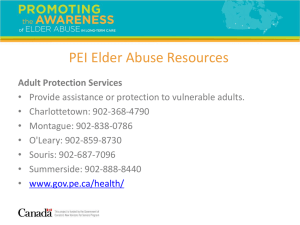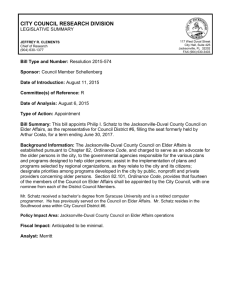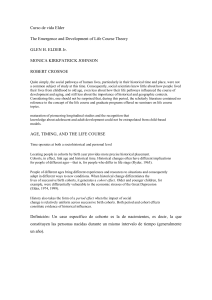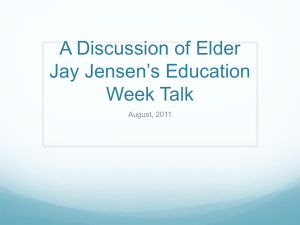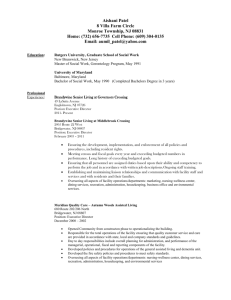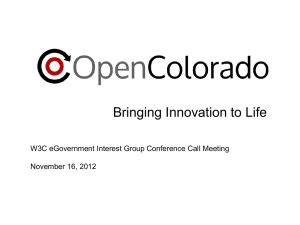Meeting of Elder Law Section of the CBA September 25, 2003 1. The
advertisement
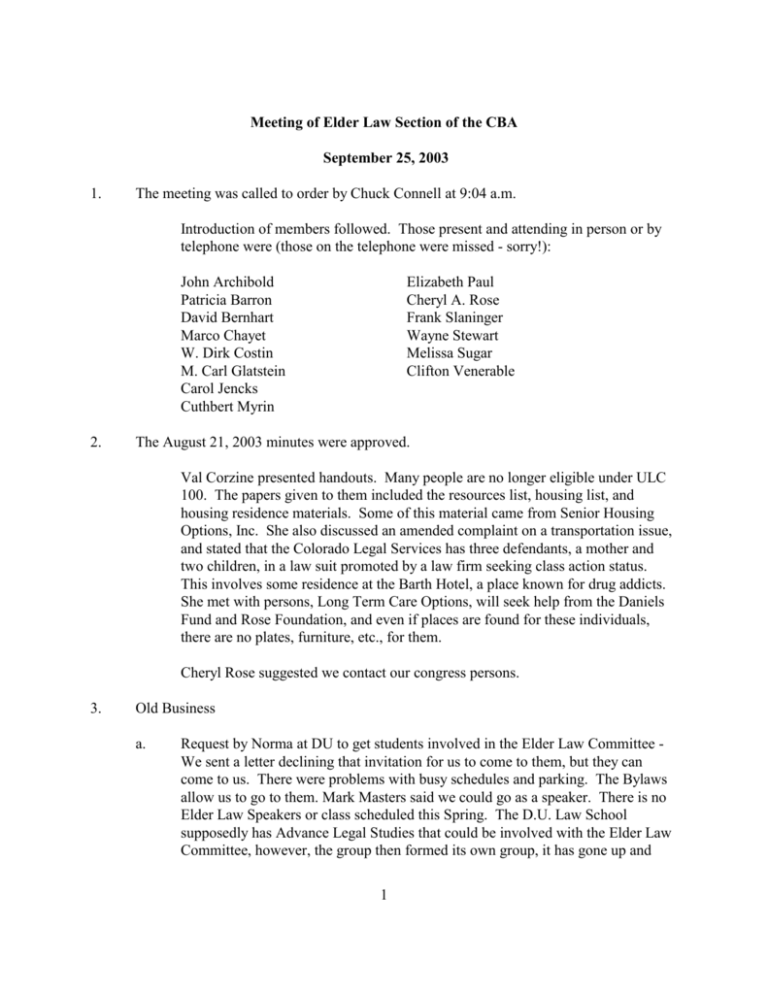
Meeting of Elder Law Section of the CBA September 25, 2003 1. The meeting was called to order by Chuck Connell at 9:04 a.m. Introduction of members followed. Those present and attending in person or by telephone were (those on the telephone were missed - sorry!): John Archibold Patricia Barron David Bernhart Marco Chayet W. Dirk Costin M. Carl Glatstein Carol Jencks Cuthbert Myrin 2. Elizabeth Paul Cheryl A. Rose Frank Slaninger Wayne Stewart Melissa Sugar Clifton Venerable The August 21, 2003 minutes were approved. Val Corzine presented handouts. Many people are no longer eligible under ULC 100. The papers given to them included the resources list, housing list, and housing residence materials. Some of this material came from Senior Housing Options, Inc. She also discussed an amended complaint on a transportation issue, and stated that the Colorado Legal Services has three defendants, a mother and two children, in a law suit promoted by a law firm seeking class action status. This involves some residence at the Barth Hotel, a place known for drug addicts. She met with persons, Long Term Care Options, will seek help from the Daniels Fund and Rose Foundation, and even if places are found for these individuals, there are no plates, furniture, etc., for them. Cheryl Rose suggested we contact our congress persons. 3. Old Business a. Request by Norma at DU to get students involved in the Elder Law Committee We sent a letter declining that invitation for us to come to them, but they can come to us. There were problems with busy schedules and parking. The Bylaws allow us to go to them. Mark Masters said we could go as a speaker. There is no Elder Law Speakers or class scheduled this Spring. The D.U. Law School supposedly has Advance Legal Studies that could be involved with the Elder Law Committee, however, the group then formed its own group, it has gone up and 1 down over the years, the faculty is not interested in it, Susan Haines and David Johns have been involved with it in the past. The problem? There is no direct support by the dean because "you don't make us any money." Frank Slaninger suggested we could use the students to prepare a web page and keep up "log" on elder law issues. b. Melissa Sugar is recruiting volunteers for National Medical Directives Day. This will be held on Saturday, October 11th at the DCPA, Donald Seawell Ballroom, from 8:00 a.m. until noon. They need people to come in and act as notaries for people who want to sign powers of attorney, medical durable powers of attorney, and living wills. Enter at the Bonfils Theater in the DCPA complex, and take the escalators going up. They will close down when the number reach 500 to 600 persons. There was also a Law Line 9 program on Channel 9 on October 4, 2003, from 7:30 a.m. to 9:00 a.m.. 4. c. Anyone wanting to submit an article for the Colorado Lawyer please contact Melissa Sugar. d. Wayne Stewart and Susan Fox Buchanan will edit the Colorado Elder Law Handbook. In the past, Kathleen Negri has pushed this. They need people who are willing to read it, amplify, delete and explore new areas, such as identity theft. They have considered preparing a "supplementation." The CBA has the old one, and we need to provide something at low or no cost to those help out with hit. e. Any matters going to the board of governors should be stated specifically. At present, we have none. New Business a. Elder Law Handbook - Wayne Stewart b. October's speaker will be Eric Solem on Medicaid appeals. c. The Elder Law Committee was requested to review and comment whether they should submit an Amicus Brief in the two attached to the agenda, one involving when the statute of limitations runs in an attorney malpractice case, and second stating when a joint tenancy can be broken. Mark Masters said he was told by Willis Carpenter the Dean of Colorado Real Estate Law, that there is support for this position, and note that the Colorado Supreme Court seldom grants certiorari just to agree with the court of appeals. Our section was willing to support the 2 amicus brief in the joint tenancy case, but remain neutral on the statute of limitations case. d. The Denver Single Entry point has agreed to seek private funding to provide intensive discharge planning services for those current clients in assisted living who are affected by the new ULTC 100.2 in the Denver metro. Whether we will be successful in seeking such funding is yet to be seen. Val Corzine e. If you have any ideas on speakers and topics, please contact Chuck Connell at Phone: 970-353-2507, Fax 970-353-2509, and lawconnell@aol.com. f. As of April 1, 2003, a Medicaid applicant has only 30 days to appeal instead of 90 days. Cliff Venerable made us aware of a company called Shred It, and for $75.00 they will come to your office, cross cut documents and destroy them. 4. C.L.E. Programs - they appear at the end of the agenda. Dirk Costin said there will be a program Seniors and the Law coming out of California. We took a four to five minute break, and then our speaker began. 5. Our speaker today was Viji Sekhar, Family Care Specialist, with the Senior Resource Center. Also present was Kathleen Barela. The topic was "Availability of senior resources in the Denver Metro Area." The Senior Resource Center is Celebrating its twenty-fifth anniversary today, on September 25, 2003. It exists in many counties. A list of "resources" was passed out, a valuable multi-page document. Also, brochures and pamphlets in red and green folders were distributed. They are able to do a benefit check-up, tapping into a national program and the internet, to tell for what federal and state programs you are eligible. They provide visitors to people who are homebound. Even in Jefferson, Clear Creek and Gilpin counties. They operate a day and respite center that is open twenty-four hours a day. They help elderly people daily, there are a 180 people in the program, and it's about fiftyfifty on medicaid and on private pay. They operate from 6:30 a.m. to 7:00 p.m.. They assist people who have a fear of falling, and are busy. They are located roughly at I-70 and Ward Road, and Kipling and Ward. 3 There are rooms for people with different functioning levels. The goal is to improve their quality of life. They have good socialization, and that improves memory. Some people are introverts, only answer if they speak to them, and others are different. The goal is to provide "failure free activities." They call their program "The Club." Its starts with a church. Why: People that want to come into a facility - even if its in a church, because they are unfamiliar with the other people there in the environment. They do not presently deal with wheelchairs or incontinence. They go on trips daily, and they seek to be "out and about" especially for dementia patients. Hospital discharge planners keep them in mind, they are on the internet, and they do referrals. They are aware of HIPPA problems. They receive help from churches and others. There is a three million grant to Colorado for the "It's Never Too Late" program. Their website is www.colocaregiver.org. They offer services for eight hours, five days a week for a non-medicaid person run $58.00 a day, $300.00 a week, or $1,200.00 a month. They are located on Kendrick Lake in the Church. Susan Stern writes their handbook on Medicaid. They are licenced for assisted living, but only for private paid clients. They have a four-two-one client to staff ratio. They are proceeding with new programs. For example, they are working with Easter Seals and undertaking a water therapy program, a spiritual service holistic approach. Most of their work with people on the west side of town. They provide transportation and many services under one roof. At the Bear Valley Church, for example from 7:30 a.m. until 6:00 p.m., they provide art therapy, Spanish lessons, water therapy and other things. Other people use them for overnights and for weekends. They do fund raising. If they deal with people with dementia, they try to be there two days a week so the persons do not forget them. If they are their only one day a week, the persons do forget who they are. Most of their clients are private pay. They relieve care givers. Many times patients don't sleep or don't get in the morning. To review the situation, they need to program a visit from 10:00 a.m. to 2:00 p.m.. They want the people to see it, learn what is like, and you 4 must leave them there, the children of seniors cannot stay. There is a need to connect now, to be able to bring the person in later. They can't take high risk wanders. They also need a medical authorization to give a person medication, even something like Pepto Bismol. "We are a great support for a person without local family or with family near by, but without time for twenty-four/seven assistance." All seniors fear the nursing home, and all seniors fear they will be abandoned there. They are able to treat wounds, insulin dependent clients, and some other situations. They are having an open house tonight from 4:00 p.m. to 6:00 p.m. at 3227 Chase Street. The program and our meeting ended at 11:03 a.m. elderly\minutes.sept2003 5

